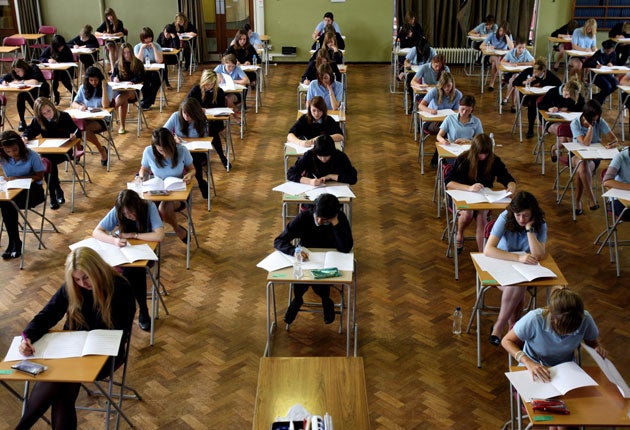Exam changes 'make it harder to maintain standards'

Your support helps us to tell the story
From reproductive rights to climate change to Big Tech, The Independent is on the ground when the story is developing. Whether it's investigating the financials of Elon Musk's pro-Trump PAC or producing our latest documentary, 'The A Word', which shines a light on the American women fighting for reproductive rights, we know how important it is to parse out the facts from the messaging.
At such a critical moment in US history, we need reporters on the ground. Your donation allows us to keep sending journalists to speak to both sides of the story.
The Independent is trusted by Americans across the entire political spectrum. And unlike many other quality news outlets, we choose not to lock Americans out of our reporting and analysis with paywalls. We believe quality journalism should be available to everyone, paid for by those who can afford it.
Your support makes all the difference.Continuing "rapid" changes to GCSEs and A-levels are making it harder to ensure standards are being maintained, the head of England's exams regulator said yesterday.
The introduction of modular qualifications "obscure" the demands put on students, Kathleen Tattersall, chair of Ofqual said.
It comes just two months before secondary schools begin teaching modular GCSEs - which will allow pupils to re-take papers and improve their results.
In an interview with the Press Association, Ms Tattersall also warned that the public still have "unrealistic" expectations of England's exams system, and must realise there will always be human error.
She said: "It's always very difficult monitoring standards over time.
"It is easy to say that standards over time must be maintained, of course they must.
"I would say that what we are really talking about is having to ensure that the demands we make on students are as great as they ever were. The context in which those demands are made does change considerably.
"The organisation of exams, teacher assessment, whether it's a unitised examination, all obscure the issue of demands made on students."
She said that much of today's exams include topics that did not exist, or were not relevant 20 years ago, making it almost impossible to compare exams.
"You have to be able to try to apply professional judgment that the demands made on students in this set of examinations are as great as demands made on students five or 10 years ago.
"That's what we are trying to do. Rapid change does not make it any easier."
Critics have suggested that modular exams are easier because they test specific areas, and students can repeat papers.
But Ms Tattersall insisted this is not the case, because such exams leave "no hiding place" for students.
"It can't be easier because the test has to be of the same level of demand, particularly because every part of what a student has been learning is now subject to testing," she said.
"Because the system is different, you don't have that comparison, it becomes more difficult to demonstrate that standards are being subjected to the same level of demand."
Ms Tattersall said the exams system must be more open about the difficulties it faces.
She said that the medical profession had feared losing public confidence if it reveals details of operation success rates, but these fears had proved unfounded.
"We have to communicate effectively with the public, what the nature of the system is, what changes are coming along, what the impact on their own children may be."
Ms Tattersall said: "There always have been unrealistic expectations, it is not any different now than it used to be, other than the fact that people today, quite rightly, are more questioning of any system they come into contact with."
She added: "There is an expectation that every grade and every level will be absolutely right, but the reality is when you involve human beings, be it the people who sat the test, or marked the test or graded the test or the candidates themselves, then you are going to have an element of unreliability, because human beings are not perfect."
Ms Tattersall said that "unrealistic expectations will become more realistic" as the public are given more information about the examinations system.
From September this year, the vast majority of GCSEs will be modular, allowing students to sit papers in "bitesize" units and re-take them once if necessary.
Ms Tattersall said it was "difficult to say" if there would be a jump in GCSE results after these exams are brought in.
There was a leap in the A-level pass-rate in 2002, the first year of results after the exams were unitised in 2000.
Ms Tattersall said: "We have no idea what the nature of these results will be, whether there will be a jump, or a fairly steady progression."
Join our commenting forum
Join thought-provoking conversations, follow other Independent readers and see their replies
Comments